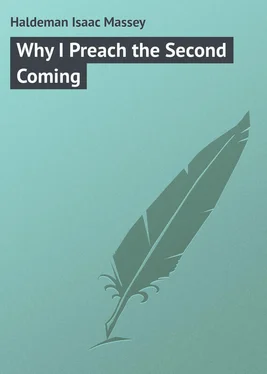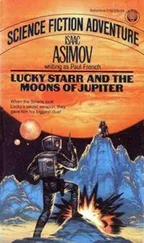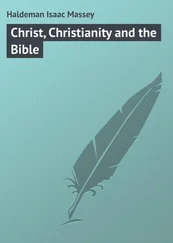Isaac Haldeman - Why I Preach the Second Coming
Здесь есть возможность читать онлайн «Isaac Haldeman - Why I Preach the Second Coming» — ознакомительный отрывок электронной книги совершенно бесплатно, а после прочтения отрывка купить полную версию. В некоторых случаях можно слушать аудио, скачать через торрент в формате fb2 и присутствует краткое содержание. Жанр: foreign_prose, на английском языке. Описание произведения, (предисловие) а так же отзывы посетителей доступны на портале библиотеки ЛибКат.
- Название:Why I Preach the Second Coming
- Автор:
- Жанр:
- Год:неизвестен
- ISBN:нет данных
- Рейтинг книги:5 / 5. Голосов: 1
-
Избранное:Добавить в избранное
- Отзывы:
-
Ваша оценка:
- 100
- 1
- 2
- 3
- 4
- 5
Why I Preach the Second Coming: краткое содержание, описание и аннотация
Предлагаем к чтению аннотацию, описание, краткое содержание или предисловие (зависит от того, что написал сам автор книги «Why I Preach the Second Coming»). Если вы не нашли необходимую информацию о книге — напишите в комментариях, мы постараемся отыскать её.
Why I Preach the Second Coming — читать онлайн ознакомительный отрывок
Ниже представлен текст книги, разбитый по страницам. Система сохранения места последней прочитанной страницы, позволяет с удобством читать онлайн бесплатно книгу «Why I Preach the Second Coming», без необходимости каждый раз заново искать на чём Вы остановились. Поставьте закладку, и сможете в любой момент перейти на страницу, на которой закончили чтение.
Интервал:
Закладка:
According to the Word of the Lord Himself therefore Lot is a picture and prophecy of the closing hours of the present age with its climax the Coming and Appearing of the Lord.
After Abraham had typically offered up his son on Mount Moriah and typically received him from the dead on the third day the son for a number of chapters in the record disappears from view. Then Abraham the father sends his servant Eliezer into a far country to get a bride for this now invisible son. Eliezer meets the intended bride at a well from whence she is drawing water, goes with her into her brother’s house, takes out a pack of precious things sent from the father in the name of the son, displays them to her and invites her to become the bride of the son. She consents. The servant leads her forth. On the way he talks to her of the promised bridegroom. Suddenly she beholds him coming to meet her. He receives her, takes her into his prepared tent and she becomes his wife.
On the same mount nearly two thousand years later God the Father offered up His only begotten Son. On the third day He raised Him from the dead. For two thousand years He has disappeared from view. The Father has sent forth the Spirit to obtain a bride for His Son. He meets her at the Gospel well from whence we draw the waters of salvation. He is calling her through individual selection that she may become the corporate bride. He has brought spiritual gifts which He seeks to display in all her assemblies. He is endeavouring to lead her along the highway of time and to speak to her in the heaven speech of the Coming Bridegroom. Suddenly the Lord will come to meet her and take her into the place prepared and keep her for the marriage hour. In this simple story the analogue finds its prophetic climax in the Second Coming of our Lord.
Jacob fled from his home, the brother he had outwitted and the father whom he had deceived. As night drew on footsore and weary he cast himself upon the plain with a stone for his pillow. Visions came to him in the night. A ladder of gold reached from earth to heaven. At the top of it was a host of angels and the Lord Himself in glory. The Lord spoke to him and assured him he and his posterity should have the land on which he was lying for an everlasting possession. It was a confirmation of the oath to and the covenant with Abraham and Isaac. As the covenant can find its fulfillment only at the actual Second Coming of our Lord as the God of Jacob, this vision is the prophetic anticipation of that hour and the heaven-proclaimed assurance the Lord is coming a Second time.
Joseph was sent by his father to his brethren. They despised and rejected him. They cast him into the pit of death. He was taken out alive. He was carried away into a far country – even into Egypt. There he was exalted to become co-ruler with Pharaoh. In the hour of famine he became the bread giver, the saviour of a hungry world. At the same time he got a Gentile bride. In the hour when tribulation and sorrow came upon his brethren he revealed himself to them the second time and was owned and acknowledged by them. With his wife he came in his chariot of kingly glory and established his father and his brethren in the promised land of Goshen.
The application is so simple it applies itself.
God the Father sent His Son to His brethren in the flesh. They despised and rejected Him. They put Him in the place of death. He was raised up alive. He has gone into a far country – even into heaven itself. He is there now as one who has been exiled from earth. He has been exalted to the throne of His Father. For two thousand years of spiritual famine and hunger in the world He has been the giver of the bread of life, the saviour of men. During these years of His exile He has been obtaining a bride from among the Gentiles – that is the Church. When the hour of tribulation and anguish shall come upon His brethren in the flesh, even as He Himself has warned, He will appear in His glory, the scales will fall from their eyes as they did from Paul and they will own Him as their Messiah and Lord, the Holy One of Israel. With His Church in associate power and glory He will deliver them and place them forever in the promised land – the land of their fathers.
No sooner has Moses with the host of Israel crossed dry shod through the divided waters of the Red Sea than he lifts up his voice and sings, not of the first, but the Second Coming of the Lord. He sings of Him as a man of war, as the head of celestial armies, coming to execute judgment, overthrow iniquity and establish His reign and rule of righteousness.
When you open the historic pages of the Bible, along the seemingly driest and coldest paragraphs you may if you will behold the wheels of the King’s chariot flashing by and catch a gleam of His radiant features, now as the man of war in David, and then as the Prince of peace in Solomon.
Yonder, under the far-away stars, Job sat at his tent door and as he meditated on the brevity and vanity of human life, its hopes deferred that make the heart sick, the sound of the clods as they fall upon the coffin lid, he asked the question that has quivered down the ages – “If a man die, shall he live again?”
He answers his own question. He says he knows he will die. He knows his soul will go into the underworld of the dead. His body will be laid away in the dust. It will become nothing more than a bundle of skin and bones. He knows, also, this bundle of skin and bones is the work of God’s hand. The Lord will have respect to His work. He will remember He wrought it. At a given time He will call to Job and Job will answer; then in anticipation of the supreme moment he cries out exultantly he knows his redeemer liveth; that he shall stand in the latter day upon the earth and covered with his own flesh once more shall see his incarnate God.
Thus in those wondrous days of the long ago Job caught the shining of the morning star, heard the trumpet of the first resurrection and caught the vision of the Second Coming of his Lord.
David sweeps his fingers across the answering chords of his golden harp and sings of that hour when the Lord shall come in His glory; when the trees of the wood shall clap their hands; when the mountains shall flow down at His presence, the waves of the sea fling their hallelujahs on the resounding shore; and when the earth shall own the Lord is coming, coming not the first time to die, but the Second time as the risen one to live and reign and with none to dispute Him.
In the Song of Songs we who believe are by nature before God as black and uncomely as the sun-burned tents of Kedar, but by grace in God’s sight as beautiful as the Tyre-woven curtains of Solomon.
The breath of the spring time is in the air. The voice of the turtle dove is to be heard in the land. It is the time of love and for hearts to find their mates. The leaves of the fig tree of Israel are beginning to put forth. The seeds of hope sown in the graves of the Christian dead and watered with tears from the anguish of the living are ready to bud and blossom forth in the full flower of their assured immortality. The voice of the Bridegroom may be heard saying to the Church: “Come away my beloved. Come thou rose of Sharon and thou lily of the valley,” and presently we see the Bridegroom Himself descending and the Church going up out of the wilderness leaning on the arm of her Beloved.
So we may learn and quickly if we will, that the Song of Songs which is Solomon’s is the celebration of the nuptial hour when our Lord shall come the Second time to take His affianced Church to Himself and make her the heavenly bride of His unfolding and unfading glory.
The prophet Isaiah hears the seraphs sing their “holy, holy, holy is the Lord of hosts; the whole earth is full of his glory” till the posts of the door are moved at the wonder of the song. He sees the glory of the Coming of the Lord. He tells us the Lord is coming with fire and with His chariots like a whirlwind, to render His anger with fury, and His rebuke with flames of fire.
Читать дальшеИнтервал:
Закладка:
Похожие книги на «Why I Preach the Second Coming»
Представляем Вашему вниманию похожие книги на «Why I Preach the Second Coming» списком для выбора. Мы отобрали схожую по названию и смыслу литературу в надежде предоставить читателям больше вариантов отыскать новые, интересные, ещё непрочитанные произведения.
Обсуждение, отзывы о книге «Why I Preach the Second Coming» и просто собственные мнения читателей. Оставьте ваши комментарии, напишите, что Вы думаете о произведении, его смысле или главных героях. Укажите что конкретно понравилось, а что нет, и почему Вы так считаете.












